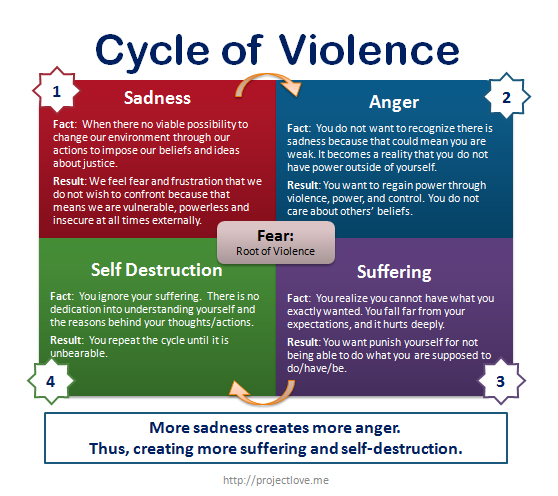In exploring the Bahá’í perspective on the origins of violence, it becomes imperative to consider the multi-faceted nature of this phenomenon. Violence does not emerge in a vacuum; rather, it is an intricate interplay of sociocultural, psychological, and spiritual factors. This article delineates the Bahá’í teachings relating to the roots of violence and posits an analysis of the mechanisms that engender such behaviors.
At its core, the Bahá’í Faith espouses the belief in the oneness of humanity. This principle posits that all individuals are interconnected, transcending the artificial divisions of race, nationality, and social class. When one segment of society is marginalized or devalued, it inadvertently fosters a climate of animosity and resentment. Thus, the Bahá’í teachings assert that a failure to recognize the inherent dignity of all human beings contributes significantly to the proliferation of violence.
Furthermore, the notion of ignorance plays a pivotal role in the Bahá’í understanding of violence. Ignorance, in this context, is not merely the absence of knowledge but encompasses a broader propensity for misunderstanding and mischaracterizing others. Individuals who are ignorant of the realities of their fellow human beings may be more susceptible to adopting violent ideologies, often driven by fear and mistrust. Consequently, Bahá’í teachings advocate for education and enlightenment as antidotes to violence, encouraging a quest for knowledge that cultivates empathy and understanding.
Another significant factor identified in Bahá’í literature is the influence of materialism on human behavior. An excessive preoccupation with material wealth can lead to competition, avarice, and ultimately, conflict. Bahá’í teachings emphasize a spiritual approach to life, wherein the accumulation of spiritual virtues takes precedence over material gain. This perspective seeks to mitigate the discontent and animosity that often arise from comparative deprivation—when individuals feel threatened by the perceived success of their peers.
Moreover, the inherent nature of humanity itself must be examined. Bahá’í teachings acknowledge that every individual is endowed with both a spiritual and a carnal nature. The carnal instincts, driven by desire and ego, can manifest in aggressive behaviors when left unchecked. Conversely, the spiritual nature, which encompasses love, compassion, and altruism, serves as the counterbalance to potential violence. This duality necessitates a conscious effort to cultivate the spiritual attributes within each individual, promoting harmony over discord.
The Bahá’í Faith also addresses the societal structures that contribute to violence. Systemic injustices, such as poverty, inequality, and oppression, often instigate conflicts and revolts. When segments of the population are disenfranchised and denied their rights, the resultant frustration can lead to violent uprisings. As a remedy, Bahá’í teachings advocate for the establishment of just and equitable systems, highlighting the importance of social equity as a foundational element in the pursuit of global peace.
Spiritual teachings further provide insight into how collective human behavior can be transformed. The practice of consultation, a key Bahá’í principle, encourages open dialogue and collective decision-making. This process fosters a sense of community and mutual respect, potentially reducing the likelihood of misunderstandings and resulting conflicts. By instituting frameworks for cooperative engagement, societies can diminish the fertile ground where violence tends to flourish.
In addressing the psychological underpinnings of violence, the Bahá’í perspective underscores the significance of emotional intelligence and conflict resolution skills. Individuals must be equipped to navigate interpersonal disagreements in a non-violent manner. The Bahá’í emphasis on character development encourages the cultivation of virtues such as patience, forbearance, and humility. By fostering emotional resilience, individuals can more effectively manage conflicts and contribute to a culture of peace.
Furthermore, the role of religious institutions in promoting peace cannot be understated. Bahá’í teachings advocate for the establishment of a global consensus on the importance of unity and peace, urging religious leaders to joined forces in addressing the causes of violence. Interfaith dialogue and collaborative efforts among diverse faith traditions are paramount in cultivating understanding and mitigating violent ideologies rooted in dogmatism and sectarianism.
To synthesize the Bahá’í approach, violence is understood as a complex construct rather than a mere act of aggression. The multifarious causes of violence—ranging from ignorance and materialism to systemic injustice and spiritual neglect—are addressed through education, collective engagement, and the promotion of social justice. By fostering a framework that prioritizes the well-being of all humanity and advocating for the spiritual development of individuals, the Bahá’í teachings present a comprehensive approach toward the eradication of violence.
In conclusion, the Bahá’í perspective on the origins of violence offers profound insights into human behavior and societal dynamics. By emphasizing the interconnectivity of humanity, the importance of education, and the necessity of just societal structures, Bahá’í teachings encourage a holistic understanding of the factors that propel individuals towards violence. This philosophical framework not only seeks to understand the roots of violence but also aspires to cultivate pathways toward a more peaceful and harmonious existence for all.
